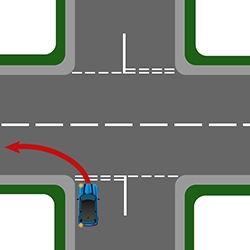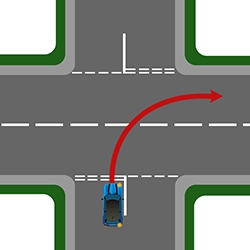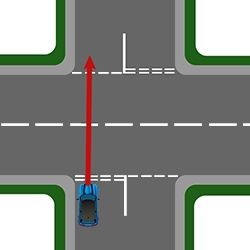How to Use Crossroad Junctions
A crossroads is usually the junction of a major and a minor road – traffic on the major road will pass through uninterrupted, while traffic on the minor road will have to stop and give way.
When approaching a crossroads, always look well ahead to see if any traffic is waiting to pull out, and remember, emerging traffic may misjudge your speed and pull out too early.
Crossroads can be accident blackspots. Serious collisions can occur when one vehicle pulls out in front of another traveling at high speed. About 100m before you reach the crossroads, you should see a crossroads road sign, and as soon as you do, you should start the MSM/PSL routine.
Be aware that crossroads road signs can be hidden by trees and difficult to see, especially when driving at night.
Marked and Unmarked Crossroads
There are two types of crossroads, marked and unmarked. On an unmarked crossroads, which will have no road signs or road markings, neither road has priority. You need to be extra careful when negotiating an unmarked crossroad. Approach slowly and be prepared to give way to traffic moving along the other road.
Marked crossroads may have Stop or Give way signs, traffic lights and/or yellow box road markings.
Road Position When Turning
When turning left or going straight ahead, you should keep to the left, leaving the right lane clear for traffic turning right.
When turning right, you should keep to the right of the lane.



- Use the MSM/PSL routine in good time
- Comply with the correct rules for turning at, entering into and emerging from the junction
- Position your car correctly and use the correct speed
- Understand the rules of priority
- Pull away safely, smoothly and under control.
Key Signs

Crossroads Road Sign. The broader line indicates priority through the junction.

Stop Sign – stop and give way.

Give Way road markings seen at crossroads between the minor and major road.

Stop line at a Stop sign.

Warning of a Give way ahead.

Longer broken white lines in the centre of the road indicate a crossroads (or another hazard) ahead.
